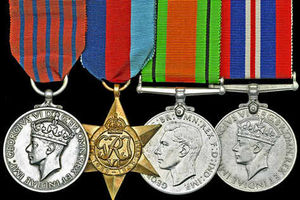George Medal set to fetch up to £5,000
A George Medal awarded to a bomb disposal expert from Wolverhampton is set to fetch between £4,000 and £5,000 at auction.
Published

A George Medal awarded to a bomb disposal expert from Wolverhampton is set to fetch between £4,000 and £5,000 at auction.
RAF Sergeant Kenneth Lythgoe, son of Bilston-born electrical engineer fitter Kenneth Lythgoe senior and wife Mary, of Waterloo Road,Wolverhampton, was one of the very first recipients of the George Medal just seventeen weeks after it was introduced by King George VI.





